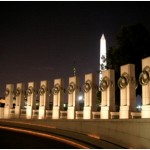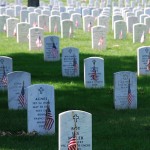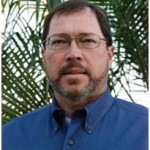Earlier this month I had the opportunity to participate in a remarkable event. It didn’t make the news. In fact it was relatively unknown beyond those who participated. Yet it was profound in its impact. With my cousin and 20 other volunteer ‘guardians’ I had the privilege of escorting my father, his brother, and 29 other WWII veterans to our nation’s Capitol to visit “their” memorial on the National Mall.
The trip was sponsored and led by Honor Flight AZ, a branch of Honor Flight Network. Per their web page, “Honor Flight Network is a non-profit organization created solely to honor America’s WWII veterans for all their sacrifices. [They] transport our heroes to Washington, D.C. to reflect and be honored at their memorials.” HFN does this at no cost to the veterans. They are committed to honoring every surviving WWII veteran (and dying or terminally ill veterans of other wars) with a visit to their memorial on the Mall.
When my father asked me over a year ago to accompany him I agreed, but reluctantly. At that time I had little interest in visiting Washington DC, or the monuments on the Mall. I could think of several reasons to say no: It’s time I don’t have. … I’m too busy with my own “ministry” travel … I don’t want to play tourist. But I agreed to go for one simple reason – to honor my father. Not because he served in the war, but simply because he was my father. This trip was important to him and he asked me to share it with him. Little did I realize the impact the trip would have on me. Little did I know that along the way a hope for the future of our nation would be stirred up in me. And little did I appreciate the importance God places on giving honor to whom honor is due, and even on memorializing, with tangible monuments, the significant events of a people and nation.
I had my first inkling of these broader themes as we left our gathering point at Phoenix’s Sky Harbor Airport and headed through security for our gate. First, the TSA crew dedicated a team and a line to clear our group through security. That consideration, however, was only a token of honor compared what happened next. At the prompting of the airline and the Honor Flight volunteers, everyone in the concourse–from security to the gate–stood, applauded and cheered! They thanked the veterans for their service and sacrifice for the cause of liberty. A broad cross-section of the American people (and most likely foreign visitors as well) honored these men of “the Greatest Generation.” And it was not the last time this happened.
Time and time again along the trip people approached our group, asked the men if they were veterans, thanked them, and showed genuine interest in their story. The honor came from mothers, from young families, from people of various racial/ethnic backgrounds, from other veterans, and active duty armed forces personnel.
Some of the most meaningful interactions came from groups of middle-school students who descend on the capital this time of year like flocks of migrating geese. These young people were genuinely interested in the lives of their esteemed elders. They didn’t just ask the questions on their field trip sheets (like checking off items on a treasure hunt) but spent significant time with the vets, engaging in their stories. They exemplified honor to whom honor is due.
The principle of honoring is found throughout the Bible. The fifth commandment (“honor your father and mother”) connects honoring parents directly with honoring God and with receiving his blessing. Paul, in Romans 13, speaks of giving honor to those to whom it is due, loosely tying it to honoring governmental authority and to the “debt of love” we carry toward all. I was struck by the thought that in honoring these men the people were directly or tacitly honoring the God who created them and also the principles of life, liberty, and well-being that these men fought to preserve in the world.
As the trip unfolded, I also began to understand a parallel theme in scripture, that of memorializing significant events and people with monuments. There is a power in setting up tangible reminders of covenants, promises, and acts that shape us as communities and nations.
The first of these is a memorial established by God himself. God set the rainbow as a memorial (“when I see it I will remember”) of his covenant with Noah to never again destroy the earth by flood. Time and time again the Israelites set up monuments to remind them of their encounters with God:
- Abraham built several altars.
- Jacob piled stones at Bethel.
- Israel placed 12 stones from the Jordan as a reminder of God’s deliverance and of bringing them to the land he promised. The stones were a witness to future generations of the goodness of God.
- Joshua set up a stone on Mt. Ebal when all Israel renewed the covenant with God after conquering the land and declared that even if they forgot, that stone heard what they said and would stand as a witness through the generations to come.
- Samuel set up a stone to remember God returning the ark to his people.
In the church we observe the greatest memorial of all, and give honor to the One for whom it stands: “Do this in remembrance of me.” When we celebrate communion we memorialize the One who sacrificed all, in love, that we might be free. We honor him, we pay tribute to his sacrifice, and we renew the covenant of life.
As I walked through the memorials on the Mall, these “stones of remembrance,” I had a sense of walking on holy ground. I was treading ground hallowed by the lives, deeds, and deaths of the men and women honored by the stones. And I began to see that these monuments were also memorials of the covenant we made with one another, before God, in our Constitution. The moment was the more poignant for me having just read the chapter on George Washington in Eric Metaxas’ book, Seven Men and the Secret of Their Greatness. Our nation’s ideals—liberty, life, justice, truth, well-being—have been strained. Yet as we honor these men, and remember what they stood for, those timeless values are preserved.
Washington, Lincoln, Jefferson, Roosevelt, King, The War to End All Wars, The Greatest Generation … all these remind us of our past and open a door for our future. There is yet a strength, a root of truth, in this nation. Though these ideals are stretched and challenged at the moment, I can feel the strength of the foundation, of the taproot of faith and hope undergirding us. We may be like the stump of a once mighty tree, yet there is still life in the root. In due season it may flower and bear fruit again.
 And so this Memorial Day I will be thankful for more than just a day off. I will honor the memory of those whose sacrifice made possible a land of liberty and sent that liberty around the world. I will honor the lives of those who honored freedom and sacrificed so that it might remain in the world. I will honor my father. I will honor the fathers of this nation who stood for what is right, true, and good – Washington, Lincoln, FDR, King, Reagan, and many others unknown or unheralded yet worthy of honor. I will honor our national fathers of faith – Jonathan Edwards, Noah Webster, Charles Finley, Francis Schaeffer, Chuck Colson, and more – whose words gave life to these ideals. And I will honor the Father of us all, who set us free with the sacrifice of his son.
And so this Memorial Day I will be thankful for more than just a day off. I will honor the memory of those whose sacrifice made possible a land of liberty and sent that liberty around the world. I will honor the lives of those who honored freedom and sacrificed so that it might remain in the world. I will honor my father. I will honor the fathers of this nation who stood for what is right, true, and good – Washington, Lincoln, FDR, King, Reagan, and many others unknown or unheralded yet worthy of honor. I will honor our national fathers of faith – Jonathan Edwards, Noah Webster, Charles Finley, Francis Schaeffer, Chuck Colson, and more – whose words gave life to these ideals. And I will honor the Father of us all, who set us free with the sacrifice of his son.
I will honor their memory and their lives by bringing the light of liberty and life wherever there is darkness and oppression. Will you join me in giving honor to whom honor is due and remembering the root from which this nation sprang?
– Bob Evans
 Bob Evans is Administrative Director of Global Network Ministries, Inc., and serves as secretary of the Board of Directors of Disciple Nations Alliance. He has travelled extensively in Asia and around the world serving local church movements and leading ministry and development teams from the U.S. Bob has four children and two grandchildren, and resides in Laguna Niguel, California.
Bob Evans is Administrative Director of Global Network Ministries, Inc., and serves as secretary of the Board of Directors of Disciple Nations Alliance. He has travelled extensively in Asia and around the world serving local church movements and leading ministry and development teams from the U.S. Bob has four children and two grandchildren, and resides in Laguna Niguel, California.







1 Comment
cam
May 28, 2013 - 7:32 amThank you Bob for sharing your thoughts. All that you wrote was very significant, profound.